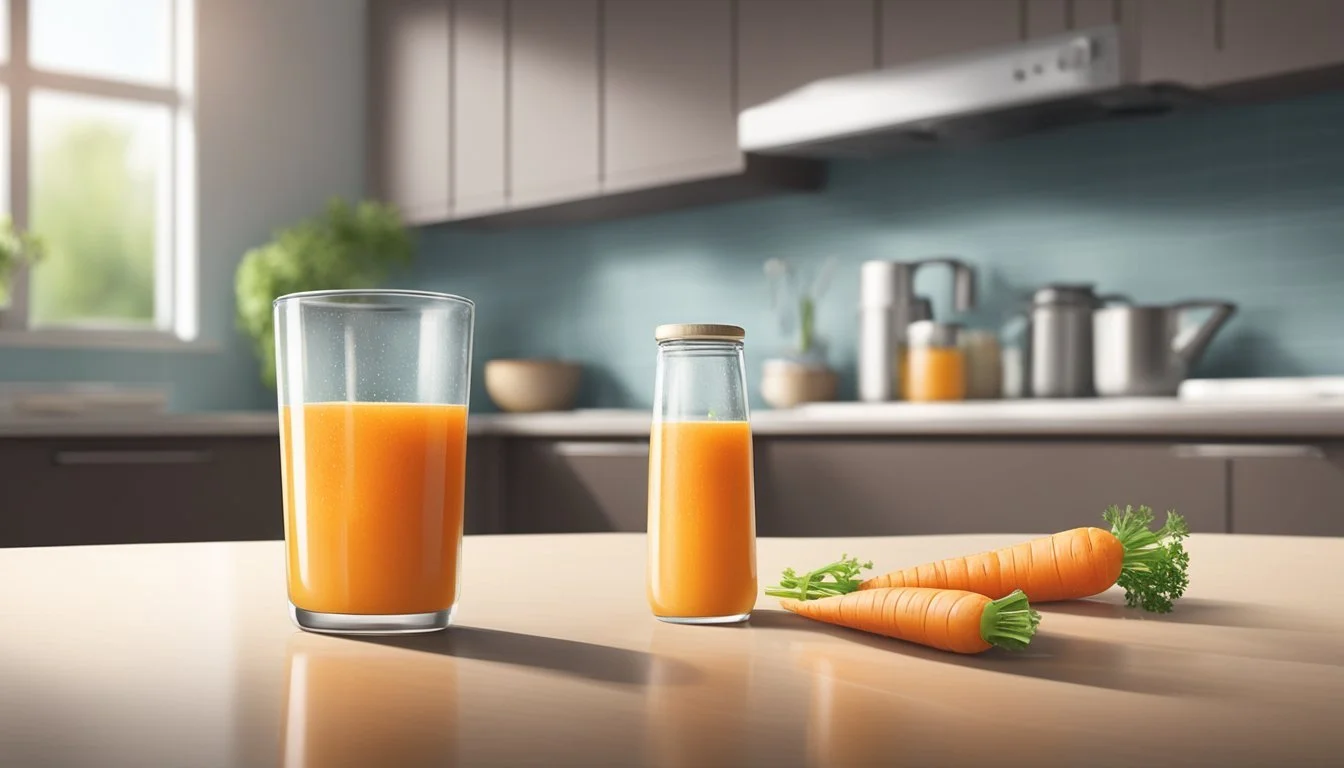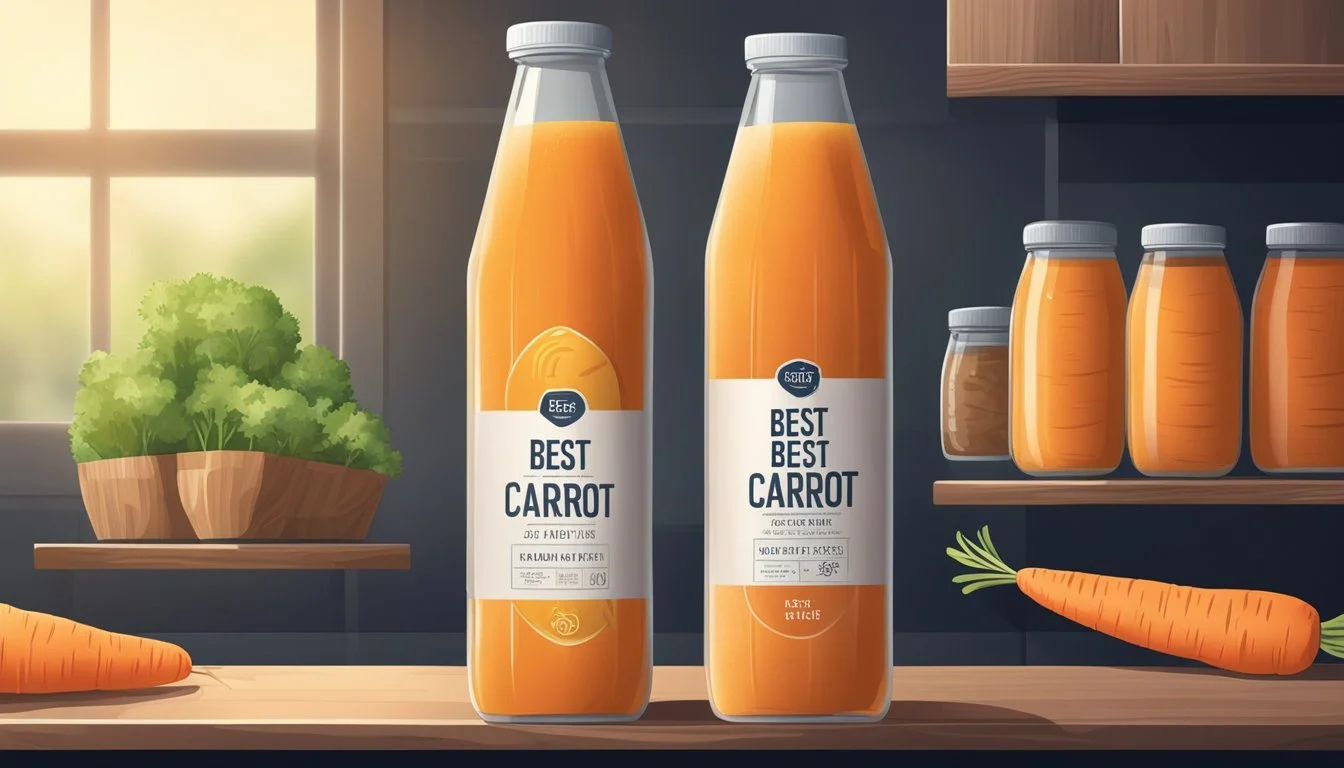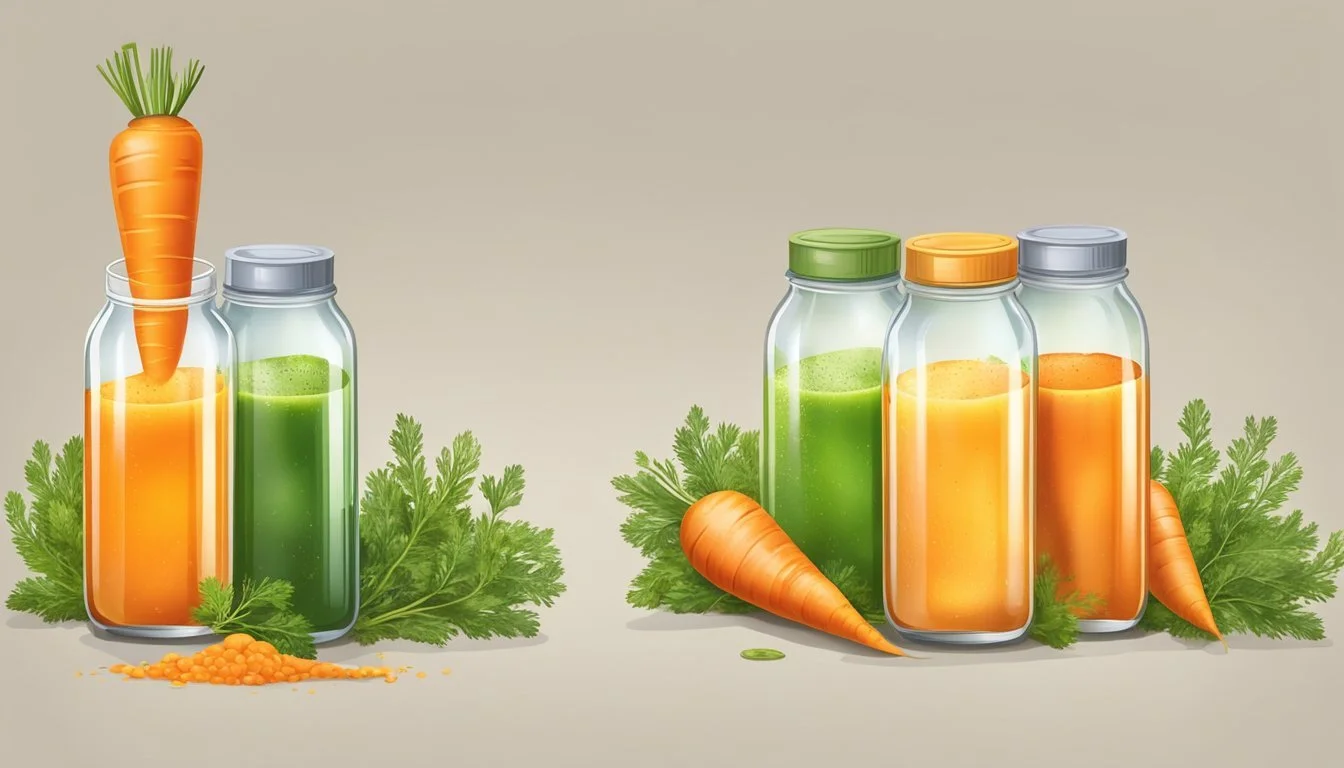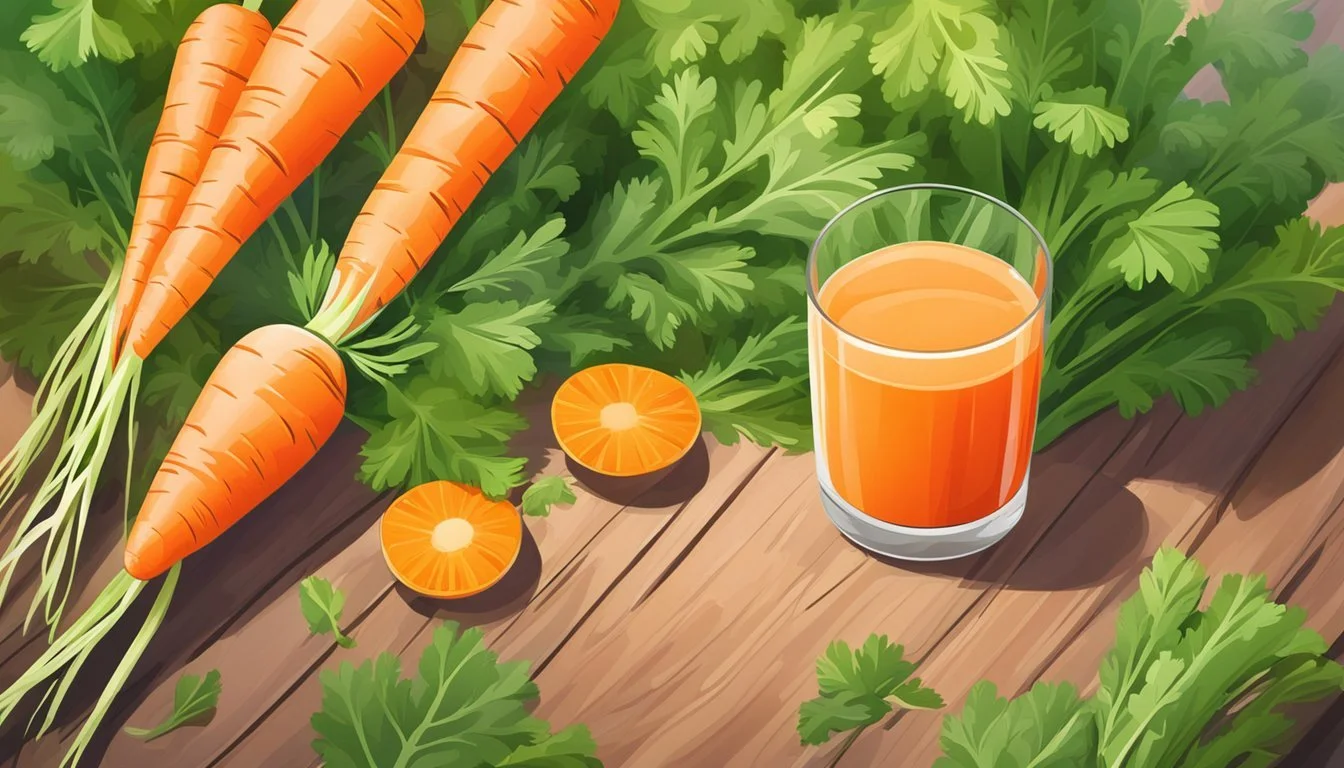Does Carrot Juice Go Bad?
Understanding Shelf Life and Spoilage Signs
Carrot juice, with its high vitamin content and sweet, earthy flavor, is a popular health beverage enjoyed by many. Often lauded for its health benefits, such as high levels of beta-carotene, fiber, and antioxidants, it's a staple in many diets. However, like other natural products, carrot juice is susceptible to spoilage. Its shelf life depends on a range of factors, including the freshness of the carrots used, the method of preparation, and the storage conditions.
When freshly made at home, carrot juice is best when consumed within 48 hours if kept refrigerated, although many consider 24 hours to be safer to ensure quality and nutritional value. On the other hand, commercially produced carrot juice that is pasteurized and sealed can last for several weeks unopened due to the processes designed to extend its shelf life. Once opened, it should be treated like fresh juice, and any changes in color, smell, or taste can be indicators that the juice is no longer good to drink.
Store-bought carrot juice often comes with a use-by date as a guideline, but for home-juiced carrot enthusiasts, knowing the signs of spoilage is crucial. An off-smell, sour taste, or a darkened color that deviates from the original vibrant orange suggests that the carrot juice may have oxidized or become unsafe to consume. Additionally, the nutritional degradation that occurs over time means that even if the juice hasn't spoiled, it may not provide the same benefits as when it was freshly juiced.
Understanding Carrot Juice
Carrot juice is a nutritious beverage made from pressed, raw carrots. Rich in essential vitamins and minerals, it offers various health benefits when consumed in moderation.
Nutritional Profile of Carrot Juice
Carrot juice is well-regarded for its high vitamin A content, primarily delivered through beta-carotene, a carotenoid that the body converts into vitamin A. This nutrient plays a vital role in maintaining eye health, immune function, and skin integrity. The juice is also a good source of vitamin K and potassium while providing smaller amounts of vitamins C and E, niacin (vitamin B3), and biotin (vitamin B7). Minerals such as iron and magnesium contribute to its nutritional value. Here is a snapshot of the nutritional content of carrot juice:
Calories: Moderate
Carbs: Present, consisting mostly of natural sugars
Protein: Low
Fat: Negligible
Fiber: Low (as most of it is lost during the juicing process)
Vitamins: A variety of vitamins including vitamin A, C, K, E, niacin, and biotin
Minerals: Contains potassium, magnesium, and iron
Antioxidants: Rich in antioxidants due to the presence of carotenoids
Varieties of Carrot Juice
The varieties of carrot juice can range from homemade concoctions to commercially produced beverages. Homemade carrot juice is usually prepared fresh, providing the highest nutritional value, especially when consumed soon after juicing. On the other hand, store-bought varieties come in two main forms: pasteurized and cold-pressed. Pasteurized carrot juice has a longer shelf life due to the heat treatment it undergoes, which kills bacteria but may reduce the levels of certain heat-sensitive nutrients. Cold-pressed juices typically retain more of the original nutrient profile, but they should be consumed relatively quickly to avoid spoilage and loss of nutritional value.
Shelf Life and Storage
When it comes to carrot juice, understanding its shelf life and proper storage methods is crucial for maintaining freshness and preventing spoilage.
Factors Affecting Shelf Life
The shelf life of carrot juice is influenced by multiple factors. Homemade carrot juice, without preservatives, typically lasts for 24 to 48 hours in the fridge. Store-bought carrot juice often lasts longer due to pasteurization and added preservatives. For example, pasteurized juice might remain at best quality for up to a week after the expiration date if kept refrigerated. Once opened, carrot juice should be consumed within 7 to 10 days; otherwise, spoilage bacteria can proliferate, causing the juice to go bad.
Proper Storage Conditions
Maintaining proper storage conditions is imperative to extend the shelf life of carrot juice. Here are the guidelines:
Store immediately: Place carrot juice in the refrigerator as soon as possible post-purchase or after juicing.
Temperature: Keep the fridge at 4°C (39°F) or below to ensure the juice remains at optimal quality.
Seal tightly: Use an airtight container to minimize exposure to air and prevent oxidation.
For commercial cans or bottles that have not been opened and are stored unrefrigerated, keep them in a cool, dark place until their expiration date.
Freezing and Thawing Methods
Freezing carrot juice can significantly extend its shelf life, preserving it safely indefinitely. However, it's important to use it within 8 to 12 months for the best quality.
Freezing:
Use an airtight container, leaving at least 1/2 inch of headspace to allow for expansion when frozen.
Thawing:
Defrost in the fridge for several hours or overnight.
For quicker thawing, submerge the container in cold water or use the microwave, but consume immediately if using these methods.
Always remember to label the freezing date on the container, and never refreeze juice that has already been defrosted.
Signs of Spoilage
When assessing whether carrot juice has gone bad, it's crucial to observe certain signs that indicate spoilage. They typically involve changes in visual aspects, smell and taste, as well as texture and consistency.
Visual Indicators
Changes in color can be a clear warning sign. Fresh carrot juice should have a vibrant orange hue. If the juice takes on a dark orange or brown color, it may not be safe to drink. Bulging in unopened, bottled carrot juice containers can also indicate fermentation or bacterial growth, suggesting spoilage.
Changes in Smell and Taste
A fresh, sweet and slightly earthy flavor is characteristic of good carrot juice. An off odor or sour smell, however, denotes that the juice is likely spoiled. This unpleasant odor can precede a change in taste, where the juice might taste sour or bitter rather than sweet due to the breakdown of sugar and other components.
Texture and Consistency
Texture changes are another indicator. Fresh carrot juice should be smooth with a consistent liquid texture. Any mold, particularly on the surface, indicates that the juice is unsafe and should be discarded. A thicker consistency or clumps forming in the juice are signs that it has gone bad.
Health Considerations
Consuming carrot juice can offer numerous health benefits, but it is important to be aware of the risks associated with drinking juice that has gone bad, as well as the recommended amounts for consumption.
Benefits of Drinking Carrot Juice
Drinking carrot juice provides an excellent source of essential vitamins and nutrients. Carrot juice is particularly rich in Vitamin A, which is derived from beta-carotene. This nutrient is crucial for maintaining eye health and can contribute to a strong immune system. The juice also contains Vitamin K, Vitamin E, potassium, and antioxidants, which collectively support heart health and can help regulate blood sugar levels. Additionally, carrot juice contains soluble fiber, which aids in digestive health.
Risks of Consuming Spoiled Juice
When carrot juice spoils, it becomes a breeding ground for harmful bacteria. Consuming spoiled carrot juice can lead to foodborne illnesses, manifesting as nausea, vomiting, and other gastrointestinal issues. Pathogens like E. coli and Salmonella are common in contaminated vegetables and can survive the juicing process if the produce is not properly cleaned. Both homemade carrot juice and commercially packaged carrot juice can pose health risks if not properly handled, pasteurized, or if they have been sold refrigerated but not kept continuously refrigerated.
Recommended Intake
It is generally recommended for an adult to have about two to three cups of vegetable juice per day. However, moderation is key, as excessive intake of carrot juice can result in carotenemia, a condition characterized by a yellow-orange discoloration of the skin due to high levels of beta-carotene. Adding lemon juice to carrot juice not only enhances flavor but can also increase the shelf life due to its acidic nature. Consumers should opt for juice with no added sugars and should always check if the juice is pasteurized, which can help minimize the risk of bacterial growth and contamination.
Enhancing Carrot Juice
Carrot juice lovers can enjoy improved taste and longevity of their favorite beverage by incorporating additional flavors and using preservatives. The section below outlines practical methods to make these enhancements.
Incorporating Additional Flavors
To elevate the palatable experience of carrot juice, adding lemon juice is an excellent choice. Lemon not only imparts a refreshing zest but also contributes to the preservation of the juice due to its acidic nature. Here is a simple flavor-enhancing addition:
Citrus Twist: Squeeze the juice of half a lemon into a cup of carrot juice.
Experimenting with other fruit juices or spices can also introduce new dimensions to the carrot juice. They may include:
Apples or ginger: For a sweet or spicy note.
Herbs like mint: For a cool, fresh aftertaste.
Extending Shelf Life with Preservatives
Preservatives can extend the shelf life of carrot juice, which is especially useful when not consumed immediately. For homemade carrot juice, consider:
Refrigeration: Store the juice in a tightly sealed container and keep at 4°C or lower for up to 48 hours.
Freezing: Freezing carrot juice in an airtight container can preserve it for up to a month.
In contrast, commercially canned carrot juice uses regulated preservatives and processes such as pasteurization to ensure a longer shelf life that can be extended to several months. For those opting for natural preservatives, possible additions include:
Vitamin C (ascorbic acid): Acts as an antioxidant.
Natural extracts: Such as rosemary extract, to inhibit spoilage.
Ensure these methods adhere to safety guidelines to keep carrot juice enjoyable and safe to drink.







